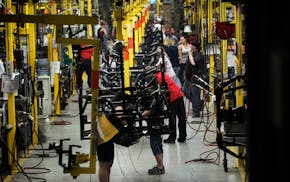The country's most powerful medtech trade group says tariffs on China, Mexico and Canada could lead to higher patient costs, calling on President Donald Trump to exempt medical devices.
As of Monday afternoon, proposed tariffs on Mexico and Canada were delayed until early March, while a 10% tariff on goods from China was expected to take effect early Tuesday. Such tariffs would function like an excise tax and could lead to layoffs as well as less research and development, said Scott Whitaker, president and CEO of the AdvaMed trade group in Washington.
"We have shared with the administration our concerns about the potential impact tariffs could have on the medical technology supply chain that American patients depend on for their care," Whitaker said in a news release. Trump's first administration carved out tariff exemptions for most devices.
Minnesota is home to more than 500 medical device companies, from small startups to Medtronic, who collectively exported more in optic and medical equipment than any other export category for the third quarter of 2024.
John Hastings, CEO of pulse oximeter manufacturer Nonin Medical in Plymouth, recently said tariffs would affect almost all medical device companies. "When you start getting into the individual components" of devices, Hastings said, "you can't avoid depending on China."
Nationwide, U.S. Census data shows imports and exports to China, Mexico and Canada have generally increased since 2014 for the category including medical devices, to a combined trading value of more than $630 billion, as of November 2024.
A spokesperson for Medtronic, which generated 48.4% of its net sales outside of the U.S. or Ireland for the most recently reported quarter, said it's "monitoring developments as the situation evolves."
Tinglong Dai, a professor at Johns Hopkins University's business school, said the U.S. medical device supply chain heavily relies on China for components such as batteries, and Canada for finished products and logistics.
"Tariffs can hike costs for essential components, making medical devices more expensive and shortages more likely," Dai said in an email.
Whitaker said tariffs can hold back innovation, saying research and development spending would likely be the first casualty.
Hastings said his company, which has long assembled pulse oximeters in Minnesota, may be less exposed to the effects of tariffs than others. The company gets printed circuit boards from a Minnesota company. Companies selling over-the-counter medical devices in retail settings may be more exposed, he said, as many devices arrive in the U.S. fully assembled from China.
Yet Hastings noted, "We'll still feel it a lot."
Facilitator to help forge M Health Fairview's future, despite 'turbulent water'

Arctic Cat says workforce will be back to about 500 by late summer

Karmel Mall owner faces foreclosure suit against his Minneapolis apartments over maintenance issues

St. Cloud space shuttle project goes on, despite financial woes of its guiding force

